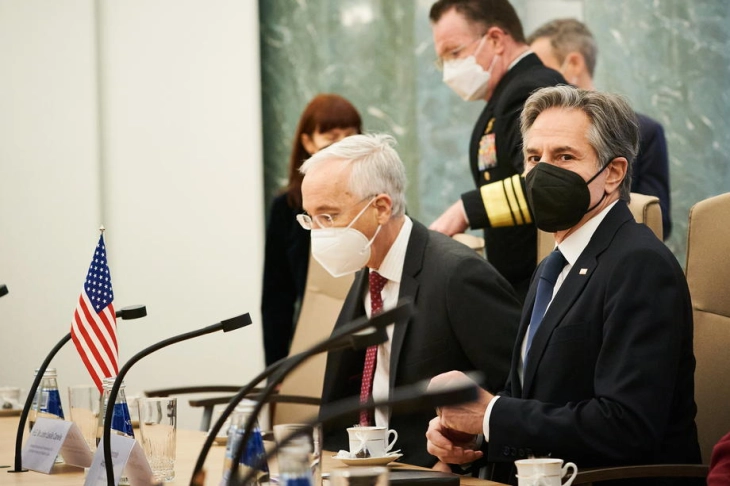NATO warns Russia that any aggression on Ukraine will come at price

Riga, 30 November 2021 (dpa/MIA) - The United States, Germany and Britain warned Russia on Tuesday that there would be a price to pay for aggression on NATO ally Ukraine, amid speculation that Moscow could be weighing up another incursion into its neighbour's territory.
"Any escalatory actions by Russia would be of great concern to the United States... and any renewed aggression would trigger serious consequences," Secretary of State Antony Blinken told reporters at a meeting of NATO foreign ministers in Riga.
German Foreign Minister Heiko Maas said that Moscow would have to "pay a high price for any form of aggression," while British Foreign Secretary Liz Truss warned Moscow that "an incursion into Ukraine would be a strategic mistake."
One day previously, their Ukrainian counterpart, Dmytro Kuleba, warned of a possible Russian invasion, and alleged that there were now 115,000 Russian troops stationed near to the border. These figures could not be independently verified.
Moscow annexed the Ukrainian peninsula of Crimea in 2014 and also backs pro-Russian separatists in Ukraine's eastern regions of Luhansk and Donetsk, known collectively as Donbas.
According to UN estimates, about 13,000 people have died there since the conflict began seven years ago. Plans spearheaded by France and Germany for a peace deal have come to naught.
It is unclear how NATO states would respond if Moscow were to send troops over the border, and whether Russia would indeed risk such an escalation. Western countries already sanctioned Russia over the conflict. Harsher punitive measures are one possibility.
The Kremlin fended off accusations of a renewed build-up in recent weeks, saying it can move troops on its own territory as it pleases.
On Tuesday, President Vladimir Putin said Russia was concerned about NATO military exercises at his country's border. "All of this poses a threat to us," Putin said, according to Novosti state news agency.
Britain's Truss hit back in a written statement. "We have seen this playbook from the Kremlin before when Russia falsely claimed its illegal annexation of Crimea was a response to NATO aggression. NATO is an alliance forged on the principle of defence, not provocation. Any suggestion that NATO is provoking the Russians is clearly false."
Also of concern at the foreign ministers' talks ending Wednesday is the ongoing but abating crisis at NATO member Poland's frontier with Belarus. Thousands of refugees have been stranded there for weeks, allegedly propelled towards the border by Minsk - an ally of Moscow - in revenge for Western sanctions.
The alliance is also to address internal matters at the talks, including an ongoing review of its core strategic goals. The ministers are also coming to terms with the fallout from their mission in Afghanistan, which ended in calamity this August, by conducting an internal review.
"This is an important milestone in the comprehensive review of the international community's engagement in Afghanistan and is crucial for us to learn the necessary lessons," Maas said on the subject.
Soon after NATO troops withdrew, the militant Islamist Taliban regained power in Afghanistan, almost two decades after being ousted by the United States. The goal of the mission had originally been to prevent precisely that.
Before the war started, the Taliban had been harbouring international terrorists. The attacks that hit the US on September 11, 2001 were prepared in Afghanistan.







